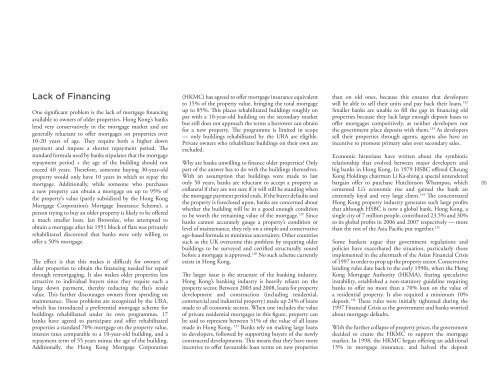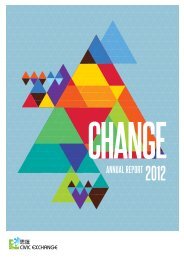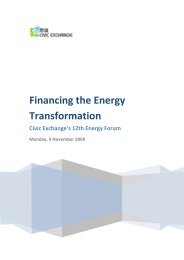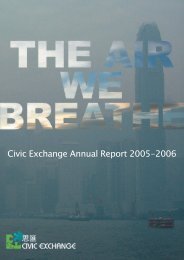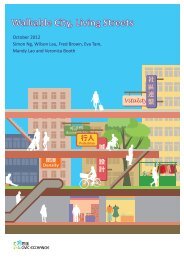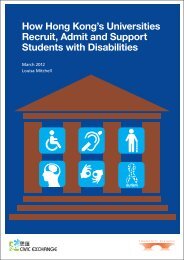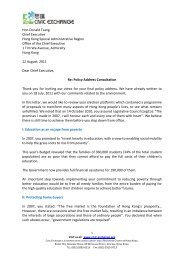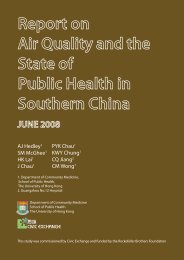Treating the Symptoms - A Critical Review of ... - Civic Exchange
Treating the Symptoms - A Critical Review of ... - Civic Exchange
Treating the Symptoms - A Critical Review of ... - Civic Exchange
- No tags were found...
You also want an ePaper? Increase the reach of your titles
YUMPU automatically turns print PDFs into web optimized ePapers that Google loves.
Lack <strong>of</strong> FinancingOne significant problem is <strong>the</strong> lack <strong>of</strong> mortgage financingavailable to owners <strong>of</strong> older properties. Hong Kong’s bankslend very conservatively in <strong>the</strong> mortgage market and aregenerally reluctant to <strong>of</strong>fer mortgages on properties over10-20 years <strong>of</strong> age. They require both a higher downpayment and impose a shorter repayment period. Thestandard formula used by banks stipulates that <strong>the</strong> mortgagerepayment period + <strong>the</strong> age <strong>of</strong> <strong>the</strong> building should notexceed 40 years. Therefore, someone buying 30-year-oldproperty would only have 10 years in which to repay <strong>the</strong>mortgage. Additionally, while someone who purchasesa new property can obtain a mortgage on up to 95% <strong>of</strong><strong>the</strong> property’s value (partly subsidized by <strong>the</strong> Hong KongMortgage Corporation’s Mortgage Insurance Scheme), aperson trying to buy an older property is likely to be <strong>of</strong>fereda much smaller loan. Ian Brownlee, who attempted toobtain a mortgage after his 1951 block <strong>of</strong> flats was privatelyrehabilitated discovered that banks were only willing to<strong>of</strong>fer a 50% mortgage.The effect is that this makes it difficult for owners <strong>of</strong>older properties to obtain <strong>the</strong> financing needed for repairthrough remortgaging. It also makes older properties lessattractive to individual buyers since <strong>the</strong>y require such alarge down payment, <strong>the</strong>reby reducing <strong>the</strong> flat’s resalevalue. This fur<strong>the</strong>r discourages owners from spending onmaintenance. These problems are recognized by <strong>the</strong> URA,which has introduced a preferential mortgage scheme forbuildings rehabilitated under its own programmes. 17banks have agreed to participate and <strong>of</strong>fer rehabilitatedproperties a standard 70% mortgage on <strong>the</strong> property value,interest rates comparable to a 10-year-old building, and arepayment term <strong>of</strong> 55 years minus <strong>the</strong> age <strong>of</strong> <strong>the</strong> building.Additionally, <strong>the</strong> Hong Kong Mortgage Corporation(HKMC) has agreed to <strong>of</strong>fer mortgage insurance equivalentto 15% <strong>of</strong> <strong>the</strong> property value, bringing <strong>the</strong> total mortgageup to 85%. This places rehabilitated buildings roughly onpar with a 10-year-old building on <strong>the</strong> secondary marketbut still does not approach <strong>the</strong> terms a borrower can obtainfor a new property. The programme is limited in scope— only buildings rehabilitated by <strong>the</strong> URA are eligible.Private owners who rehabilitate buildings on <strong>the</strong>ir own areexcluded.Why are banks unwilling to finance older properties? Onlypart <strong>of</strong> <strong>the</strong> answer has to do with <strong>the</strong> buildings <strong>the</strong>mselves.With an assumption that buildings were made to lastonly 50 years, banks are reluctant to accept a property ascollateral if <strong>the</strong>y are not sure if it will still be standing when<strong>the</strong> mortgage payment period ends. If <strong>the</strong> buyer defaults and<strong>the</strong> property is foreclosed upon, banks are concerned aboutwhe<strong>the</strong>r <strong>the</strong> building will be in a good enough conditionto be worth <strong>the</strong> remaining value <strong>of</strong> <strong>the</strong> mortgage. 129 Sincebanks cannot accurately gauge a property’s condition orlevel <strong>of</strong> maintenance, <strong>the</strong>y rely on a simple and conservativeage-based formula to minimize uncertainty. O<strong>the</strong>r countriessuch as <strong>the</strong> UK overcome this problem by requiring olderbuildings to be surveyed and certified structurally soundbefore a mortgage is approved. 130 No such scheme currentlyexists in Hong Kong.The larger issue is <strong>the</strong> structure <strong>of</strong> <strong>the</strong> banking industry.Hong Kong’s banking industry is heavily reliant on <strong>the</strong>property sector. Between 2003 and 2008, loans for propertydevelopment and construction (including residential,commercial and industrial property) made up 24% <strong>of</strong> loansmade to all economic sectors. When one includes <strong>the</strong> value<strong>of</strong> private residential mortgages in this figure, property canbe said to represent between 51% <strong>of</strong> <strong>the</strong> value <strong>of</strong> all loansmade in Hong Kong. 131 Banks rely on making large loansto developers, followed by supporting buyers <strong>of</strong> <strong>the</strong> newlyconstructed developments. This means that <strong>the</strong>y have moreincentive to <strong>of</strong>fer favourable loan terms on new propertiesthan on old ones, because this ensures that developerswill be able to sell <strong>the</strong>ir units and pay back <strong>the</strong>ir loans. 132Smaller banks are unable to fill <strong>the</strong> gap in financing oldproperties because <strong>the</strong>y lack large enough deposit bases to<strong>of</strong>fer mortgages competitively, as nei<strong>the</strong>r developers nor<strong>the</strong> government place deposits with <strong>the</strong>m. 133 As developerssell <strong>the</strong>ir properties through agents, agents also have anincentive to promote primary sales over secondary sales.Economic historians have written about <strong>the</strong> symbioticrelationship that evolved between major developers andbig banks in Hong Kong. In 1979 HSBC <strong>of</strong>fered CheungKong Holdings chairman Li Ka-shing a special untenderedbargain <strong>of</strong>fer to purchase Hutchinson Whampoa, whichcemented Li’s economic rise and gained <strong>the</strong> bank anextremely loyal and very large client. 134 The concentratedHong Kong property industry generates such large pr<strong>of</strong>itsthat although HSBC is now a global bank, Hong Kong, asingle city <strong>of</strong> 7 million people, contributed 23.5% and 30%to its global pr<strong>of</strong>its in 2006 and 2007 respectively — morethan <strong>the</strong> rest <strong>of</strong> <strong>the</strong> Asia Pacific put toge<strong>the</strong>r. 135Some bankers argue that government regulations andpolicies have exacerbated <strong>the</strong> situation, particularly thoseimplemented in <strong>the</strong> aftermath <strong>of</strong> <strong>the</strong> Asian Financial Crisis<strong>of</strong> 1997 in order to prop up <strong>the</strong> property sector. Conservativelending rules date back to <strong>the</strong> early 1990s, when <strong>the</strong> HongKong Mortgage Authority (HKMA), fearing speculativeinstability, established a non-statutory guideline requiringbanks to <strong>of</strong>fer no more than a 70% loan on <strong>the</strong> value <strong>of</strong>a residential property. It also required a minimum 10%deposit. 136 These rules were initially tightened during <strong>the</strong>1997 Financial Crisis as <strong>the</strong> government and banks worriedabout mortgage defaults.With <strong>the</strong> fur<strong>the</strong>r collapse <strong>of</strong> property prices, <strong>the</strong> governmentdecided to create <strong>the</strong> HKMC to support <strong>the</strong> mortgagemarket. In 1998, <strong>the</strong> HKMC began <strong>of</strong>fering an additional15% in mortgage insurance, and halved <strong>the</strong> deposit35


